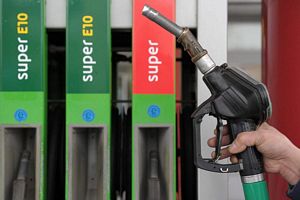|
By accessing/using The Crittenden Automotive Library/CarsAndRacingStuff.com, you signify your agreement with the Terms of Use on our Legal Information page. Our Privacy Policy is also available there. |

E10 petrol coming to the UK this year - the thin end of the wedge
|
|---|
|
|
E10 petrol coming to the UK this year - the thin end of the wedge
Matt Hubbard
Speedmonkey
March 12, 2013
UK petrol stations to start selling E10 petrol with a 10% ethanol mix later this year, and it may not be suitable for your engine.
The UK has signed up to an EU directive which means petrol at the pumps will contain 10% ethanol towards the end of 2013. Ethanol is meant to be an environmentally friendly alternative to oil. It's made from corn, and is already used in fuel in several counties including the United States.
E10 is fine for use in most modern cars that are specifically designed to run on it, but in older cars and in cars with high performance engines E10 can cause problems, such as corroding fuel lines and injector problems.
The good news is that it's use will not be compulsory and will be sold alongside regular and high octane petrol. The bad news is that this process started in the US sometime ago and they've already moved onto E15 (15% ethanol mix) which really does damage older and high performance engines.
The use of ethanol in petrol reduces our reliance on oil, which is a good thing for security of fuel supply as corn can be grown in most countries - although it does take land away from the food chain.
Petrol that contains ethanol generally has a lower octane rating than 100% petrol, typically 91 or 92 RON compared to 95 RON for unleaded. It reduces power and increases fuel consumption. Whilst it might be slightly cheaper (although the UK government loves to tax anything to do with fuel so that might not be the case) than other fuels it will ultimately cause higher fuel bills through reduced mpg.
This could be the thin end of the wedge. With E15 being used increasingly in the US many manufacturers are coming out of the woodwork and stating they will not honour warranty claims caused by the use of E15. In other words if you use E15 because it's a few cents cheaper, and it wrecks your engine you're on your own and can't claim under warranty.
The EU will no doubt introduce E15 at some point after the use of E10 has become widespread. And then we'll be in real trouble.
The German government introduced E10 some years ago much to the disgust of most German motorists who boycotted it - causing petrol stations to run out of unleaded petrol. Time magazine ran an article in 2011 highlighting the issues and problems this caused, and will surely happen in the UK later this year when E10 is introduced.
Problems with E10 and it's use of ethanol:
Ethanol is a strong solvent and cleanser. Small quantities will help keep your engine clean. Larger amounts will wear components and corrode rubber lines etc
Ethanol has high water absorption properties. It attracts, absorbs and holds water
The Octane of fuel stored in the tank can drop due to water absorption
Ethanol can damage expensive O2 sensors, injectors, alter ignition timing, cause knocking
Ethanol can cause engine hesitation, stalling, hard starting and general underperformance of engines


















